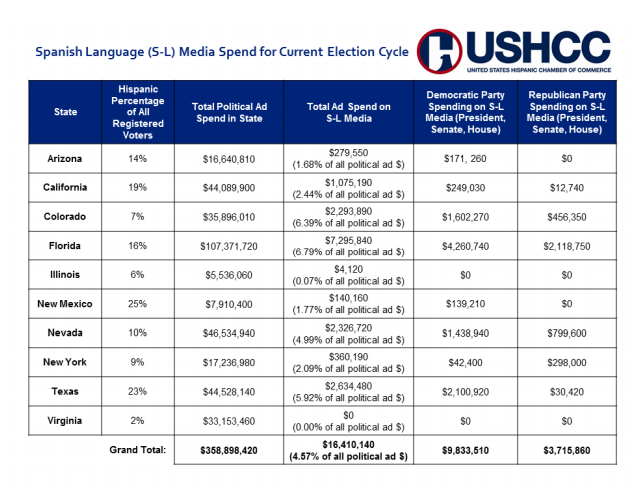Spending On Spanish Language Advertising In 2012 Election Significantly Lagging

ANALYSIS OF TEN KEY STATES FINDS SPANISH-LANGUAGE ADVERTISING REPRESENTS LESS THAN 5%
OF TOTAL MEDIA SPEND
WASHINGTON, DC – The United States Hispanic Chamber of Commerce (USHCC) today issued a new report as part of the Speak Our Language project that found Spanish-language advertising continues to represent a relatively small fraction of election advertising spending, even in the states with the largest and most electorally-significant Hispanic populations.
Using comprehensive data on local television advertising from Kantar Media’s CMAG, the study found that in ten states analyzed from April 10, 2012 to Sept. 25, 2012 the total spend on political advertising was $358,898,420. Of that sum, $16,410,140 went to Spanish-language advertising, representing just 4.57 percent.
This period covers the full “general election” season following the effective conclusion of the GOP primary campaign. The study looked at political TV advertising spending in Arizona, California, Colorado, Florida, Illinois, New Mexico, Nevada, Texas and Virginia on local, state and federal election races.
“Political commentators from both sides of the aisle have said repeatedly that 2012 is the ‘year of the Hispanic voter.’ Hispanic voters are poised to play a decisive role in some of the most hotly contested battleground states from Nevada to Florida,” said Javier Palomarez, President and CEO of the USHCC.
“But while political advertising spending records are being shattered, neither political party is investing a comparable percentage of their advertising dollars to reach these voters. The difference between rhetoric and action is striking and, frankly, troubling.”
While both parties are spending a relatively small percentage of their advertising budgets on Spanishlanguage media, there are some noteworthy differences between the parties. At the presidential level, the Obama campaign and the various organizations supporting it have dedicated roughly 9 percent of all ad dollars in the ten states analyzed by CMAG to Spanish-language media, while the Romney campaign and the organizations supporting it have dedicated just over 4 percent.
The same general pattern holds true further down the ballot. In the Senate races taking place in the surveyed states, Democratic candidates and supportive organizations have dedicated 3 percent of their budgets to Spanish-language advertising compared to 1 percent for GOP candidates and groups. At the U.S. House level, Democratic candidates and groups have invested about 12 percent of their ad dollars in Spanish-language, while thus far Republican House campaigns have invested less than 1 percent.
“Historically, Spanish-language advertising has represented a relatively small share of all political dollars,” said CMAG President Ken Goldstein. “This year, there has been a great deal of speculation that we would see a significant jump in Spanish-language ad spending. That may yet happen, but so far this cycle it appears that ad spending is closer to historical norms than any sort of break out year.”
While not comparable to the results from the ten states, CMAG’s previous research showed that overall, in 2008, an average of just 4.03 percent of all political TV ad spending across 28 top markets went to Spanish-language stations, and in 2010 just 3.9 percent went to Spanish-language stations.
At the same time, the percentage of the electorate that is Hispanic continues to grow. In 2008, 40 percent of all new voters were Hispanic. In 012, the number of registered Hispanic voters is expected to exceed 14 million.
This trend has held true even in states with the largest Hispanic populations on a percentage basis. For example, in Florida where 16 percent of all registered voters are Hispanic only 7 percent of the more than $107 million dollars spent to-date have been on Spanish-language media. Similarly, in the battleground state of Nevada, where 10 percent of registered voters are Hispanic, roughly 5% of the $46.5 million spent on advertising so far has been dedicated to Spanish-language media.
“The truth is that advertising is the single most effective tool candidates and parties have to communicate their message to voters. So when those candidates and parties fail to advertise on Spanish-language media, it has the practical effect of cutting millions of Hispanics out of America’s
political conversation,” added Monica Lozano, CEO of ImpreMedia.
“There is no ‘right’ level of Spanish-language advertising,” Palomarez added. “But certainly both major parties should be prioritizing Hispanic voters and dedicating real resources to reaching those voters. It is not clear that has happened yet in 2012. With just over a month until Election Day, we are hoping to see more focus on connecting with Hispanic voters nationwide and we plan to release a final report immediately following the election.”
For more information, visit http://www.ushcc.com/
###
About the United States Hispanic Chamber of Commerce
Founded in 1979, the USHCC actively promotes the economic growth and development of Hispanic entrepreneurs and represents the interests of over 3 million Hispanic-owned businesses in the United States that generate in excess of $465 billion annually. It also serves as the umbrella organization for more than 200 local Hispanic chambers in the United States and Puerto Rico.



